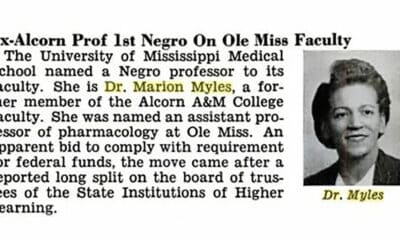Mississippi Today
Ray Mabus: Some strides made during my governorship are gone, but the path forward remains clear
This essay is part of an ongoing Mississippi Today Ideas series showcasing first-person perspectives of former Mississippi governors. We asked them to write about their successes while in office and perhaps what they wished had gone a little differently during their tenure.
When I ran for governor in 1987, my slogan was “Mississippi Will Never Be Last Again.” For so long Mississippi had been last in the things you want to be first in and first in the things you want to be last in. A common statement from other states was “Thank God for Mississippi.” That had to end. Mississippi needed to lead.
As governor, I, and the folks with me, began working to make that promise a reality, and, in the four years that followed, we got an amazing amount of things done and Mississippi moved out of last place in virtually every category.
We began with education because it is the only sure, long-term way to success. Here are a few of the things that were accomplished:
- Passed the largest teacher pay raise in the U.S.
- Enacted the largest percentage funding increase for higher education in the country for two years.
- Increased the high school graduation rate by 5.7% while the national rate declined.
- Developed the Office for Literacy, which Atlantic Monthly called “the most ambitious initiative in the nation to combat adult illiteracy.”
- In days before computers were everywhere, put a computer lab in every elementary school in the state, teaching a very successful “Writing to Read” program.
- Led the nation in percentage of students taking upper level science courses.
- Used fiber optics to allow students to participate remotely in courses through interactive audiovisual communications long before the ubiquitous internet.
- Passed the most comprehensive education reform act in America.
In jobs and economic development:
- 90,000 net new jobs in four years.
- First in U.S. in new manufacturing plants by population.
- $4 billion in new investments.
- Complete rewrite of economic development laws including tax credits for child care and educational benefits.
- Fifth largest drop in unemployment in country.
- 11th fastest per capita income gain in America.
- 25th in creation of new jobs.
- Unemployment lowest in more than a decade.
- Tourism increased by 41% and exports by 51%.
- Growth in welfare cut by 87%.
- Successful Jobs for Mississippi’s Graduates for highly at-risk youth started.
In health care:
- Largest expansion of health care coverage in state’s history by increasing Medicaid covering more than 100,000 additional Mississippians and keeping the state’s hospitals open and vital.
- The lowest infant mortality rate in state’s history.
- An intense focus on early childhood and child care.
In government:
- Changed form of county government to reduce cost and corruption, which was part of my legacy as state auditor.
- Largest restructuring of state government in history.
- First governor to propose a budget.
- Appointed first woman to head a Highway Patrol in the U.S.
- Most Black Mississippians appointed to senior roles in state’s history.
- Enacted first capital budget.
- No tax increases.
- Budget always balanced.
But all this is just a far-from-complete list of nearly four-decade old statistics. What this doesn’t capture at all was our goal. It wasn’t just to move Mississippi out of last place and up the list in these categories, it was to try to make lives better and futures brighter for ALL Mississippians.
All this was done to make Mississippi more competitive and to provide opportunities so that young Mississippians would stay and build their lives here. All this was done to make sure babies were born healthy and had the best educational opportunities starting in early childhood so that they could make the most of their lives. All this was done so that all Mississippians had the right to good health care so that the state didn’t lead the country in preventable diseases and so many other bad categories and so that EVERYONE could fulfill their potential.
But for all that we — the people of Mississippi — did at that time to make our state the positive exception and example, looking at today and to the future, so many of those gains are gone. Mississippi is one of only three states which lost population between 2010-2020. People are voting with their feet and moving out, and others are not moving in. The needs in Mississippi are the same as they were in the late 1980s. We know what we need to do to address those needs, and we know it will work.
A much better job has to be done in public education. Education for everyone is the only way to a better future and a better state. Public education has to be better supported both financially and culturally. Tax money should go to public education and none to private schools, which is just a way to help the well-to-do and a cruel hoax on everyone else.
Health care has to be a right and not a privilege. Do whatever is necessary to cover every Mississippian, starting with expanding Medicaid to the maximum extent possible. This will also keep rural hospitals open so that people can get care close to where they live. And women must have full autonomy on all their health care decisions.
There is a saying that “the only way to keep a person down in a ditch is to get down in the ditch with them.” Because of our history, Mississippi bears a special burden on race. As I said in my 1988 inaugural address: “… a new day depends fundamentally on our resolve to banish racism forever from the state of Mississippi. We know in our hearts that the chains of prejudice have bound more than one group; they have held all of us back. A society divided against itself cannot prosper. And we know from history and our own lives the anguish and frustration of racial injustice — and we can be proud that so many among us have given so much in the belief that we shall overcome. We share the faith that we are each God’s children. After all the years, let us hear anew His truth that we are all brothers and sisters. That idea is written into our laws; now it must be woven into the fabric of our lives.”
Ray Mabus served as Mississippi governor from 1988 until 1992. He had previously served as state auditor. On the federal level, he served as U.S. ambassador to Saudi Arabia in the 1990s and as U.S. Secretary of the Navy from 2009 until 2017. Mabus, an Ackerman native, resides in West Virginia with his wife Lynne. He has three children.
This article first appeared on Mississippi Today and is republished here under a Creative Commons license.![]()
Mississippi Today
On this day in 1965
On this day in 1965
March 13, 1965

Dr. Marion Myles accepted a position at the University of Mississippi Medical Center. Three months later, the vice chancellor appointed her an assistant professor of pharmacology, the first Black American on the faculty.
Her appointment came over the objections of some members of the board of trustees of the state Institutions of Higher Learning.
Prior to accepting the appointment, Myles taught biology, botany, agronomy and zoology at several universities. An expert in plant physiology, she studied the effects of drugs and hormones on plant growth. She received a Carnegie Foundation Research Grant and was awarded research fellowships at the California Institute of Technology and at the Institute of Nuclear Studies at Oak Ridge National Laboratory in Tennessee.
The same year that the medical center appointed her, the center offered a residency slot to Dr. Aaron Shirley, the first Black resident.
This article first appeared on Mississippi Today and is republished here under a Creative Commons license.![]()
Mississippi Today
‘A good start’: Senate passes pharmacy benefit manager reform bill

The Senate passed a bill Wednesday that would increase the regulation and transparency of pharmacy benefit managers, which advocates argue will protect patients and independent pharmacists.
The legislation, authored by Sen. Rita Parks, R-Corinth, beefs up a House of Representatives bill focusing on the transparency of pharmacy benefit managers by adding language to tighten appeal procedures, bar the companies from steering patients to affiliate pharmacies and prohibit spread pricing – the practice of paying insurers more for drugs than pharmacists in order to inflate pharmacy benefit managers’ profits.
Parks said the bill, which passed 46-4, has the support of the House, which can now send it to the governor’s desk to sign or go to conference with the Senate to negotiate changes.
“This is the furthest we’ve been in two years,” said Parks. “We’re bringing fairness to the patient and to independent pharmacists.”
The bill’s passage came after a strong showing of support for reform from independent pharmacists, who have warned that if legislators do not pass a law this year to regulate pharmacy benefit managers, which serve as middlemen in the pharmaceutical industry, some pharmacies may be forced to close. They say that the companies’ low payments and unfair business practices have left them struggling to break even.
The Senate’s original bill died in the House, but the body revived most of its language by inserting it into a similar House bill, House Bill 1123, which was authored by House Speaker Jason White.
The Senate made several concessions in the most recent version of the legislation, including forgoing a provision that would have required pharmacy benefit managers to reimburse prescription discount card claims within seven days. These claims are currently paid within 60 to 90 days, which pharmacists argue is a burdensome timeframe.
The bill is a “good start” to real pharmacy benefit manager reform and transparency, said Robert Dozier, the executive director of the Mississippi Independent Pharmacy Association.
“The independent pharmacists are pleased with the current form of House Bill 1123,” he said. “They did not get everything they wanted, but they got what they needed.”
The bill also gives the Mississippi Board of Pharmacy more tools to conduct audits and requires drug manufacturers, pharmacy benefit managers and health insurers to submit data to the Mississippi Board of Pharmacy, which will be available to the public.
Sen. Jeremy England, R-Ocean Springs, said he is concerned the bill will lead to higher health insurance costs for employers, including the state itself, which provides health insurance to state employees.
Pharmacy benefit managers negotiate rebates, or cost savings, for employers, and some critics of pharmacy benefit manager reform argue that regulating the companies’ business practices will lead to higher insurance costs for employers.
England said that Mississippi employers stand to lose tens of millions of dollars and that regulation could deter new businesses from coming to the state.
“This language that we are trying to put into state law here goes too far, in fact it goes to the point where it could end up costing jobs,” he said.
A vote requested by England to determine if a fiscal note is necessary for the bill failed.
Parks said she disagreed that the bill would raise state health insurance costs and called England’s concerns a “scare tactic” meant to deter legislators from passing the bill.
England also proposed an amendment to the bill to remove self-funded insurance plans, or health plans in which employers assume the financial risk of covering employees’ health care costs themselves, from a section of the bill that prohibits pharmacy benefit managers from steering patients to specific pharmacies and interfering with their right to choose a particular pharmacy.
Self-funded health plans often use pharmacy benefit managers to administer prescription drug benefits and process claims.
Parks argued that excluding self-funded health plans from those guidelines would remove the fundamental protections the bill affords pharmacies and patients.
England’s amendment failed.
“Mississippi’s been a beacon in where we have stood with PBM,” Parks said. “We need to continue to be that beacon and not go backwards.”
This article first appeared on Mississippi Today and is republished here under a Creative Commons license.![]()
Crooked Letter Sports Podcast
Podcast: Raymond basketball coach Tony Tadlock joins to talk about high school basketball championships and this week’s SEC Tournament.

One of the state’s top basketball coaches, Tadlock overcame the loss of all five starters from last year’s championship team and losing his leading scorer this season, to win a second straight state championship and the seventh in school history. Tadlock talks about how he works with a 40-man basketball roster and maintaining a remarkable winning culture at Raymond.
Stream all episodes here.
This article first appeared on Mississippi Today and is republished here under a Creative Commons license.![]()
-

 News from the South - Oklahoma News Feed5 days ago
News from the South - Oklahoma News Feed5 days agoFeed the Children rolls out new program to help Oklahoma families
-

 News from the South - Oklahoma News Feed7 days ago
News from the South - Oklahoma News Feed7 days agoMarch 6,2025: Rain and snow on the way
-

 Mississippi Today6 days ago
Mississippi Today6 days agoJudge tosses evidence tampering against Tim Herrington
-

 News from the South - North Carolina News Feed7 days ago
News from the South - North Carolina News Feed7 days agoSchool officials voice concerns as US Department of Education remains in limbo
-

 News from the South - Texas News Feed5 days ago
News from the South - Texas News Feed5 days agoFifth Ward home robbed, caught on camera
-

 Mississippi Today3 days ago
Mississippi Today3 days agoMississippians honor first Black lawmaker since Reconstruction
-

 News from the South - North Carolina News Feed6 days ago
News from the South - North Carolina News Feed6 days ago6PM News on WRAL – Friday, March 7, 2025
-

 News from the South - Tennessee News Feed5 days ago
News from the South - Tennessee News Feed5 days agoImpact of cuts to the federal government














































